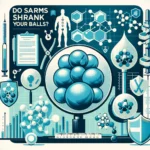Muscle Insider
New member

In recent years, Selective Androgen Receptor Modulators (SARMs) have surged in popularity within the fitness and bodybuilding communities for their promised benefits of muscle growth and fat loss without the severe side effects associated with traditional anabolic steroids.
However, amidst their growing use, concerns have arisen regarding their safety and potential side effects, particularly their impact on testicular size. This article seeks to explore the evidence behind these concerns, offering an in-depth look at how SARMs work, their effects on the body, and whether they truly can lead to testicular shrinkage.
Understanding SARMs
SARMs are a class of therapeutic compounds that have similar anabolic properties to anabolic steroids but with reduced androgenic (producing male characteristics) properties. They are designed to selectively target androgen receptors in different tissues differently, aiming to enhance muscle growth and strength while minimizing unwanted side effects.
How SARMs Affect the Body
The mechanism of SARMs involves binding to androgen receptors in the body, which are found in various tissues, including muscle, bone, and fat. By selectively targeting these receptors, SARMs can potentially increase muscle mass and bone density, reduce fat, and improve physical performance. However, the interaction with these receptors also signals the body to alter its natural production of hormones, including testosterone, which leads to concerns about testicular health and function.
The Concern: Testicular Shrinkage
Testicular shrinkage, or testicular atrophy, refers to a decrease in the size of the testes, which can result from reduced levels of circulating testosterone in the body. This condition is often associated with the use of substances that affect hormonal balance, such as anabolic steroids. The question arises, then, do SARMs, with their ability to modulate androgen receptor activity, also contribute to this condition?
Evidence from Scientific Research
While research on SARMs is still in the early stages compared to that on anabolic steroids, some studies and anecdotal evidence suggest that SARMs can indeed lead to a reduction in natural testosterone production, potentially causing testicular shrinkage. The extent of this effect appears to vary depending on the type of SARM, dosage, and duration of use.
Testimonials and User Experiences
Anecdotal evidence from forums and community discussions among SARMs users indicates mixed experiences. Some users report experiencing testicular shrinkage during or after a SARM cycle, while others claim not to have faced any such side effects. It’s important to note, however, that personal experiences can vary widely and may not always accurately represent the safety profile of these compounds.
Preventive Measures and Safer Use
For those considering or currently using SARMs, there are steps that can be taken to mitigate the risk of side effects, including testicular shrinkage:
- PCT (Post Cycle Therapy): Engaging in a proper PCT after a SARM cycle can help restore natural hormone levels and mitigate some of the potential side effects, including testicular atrophy.
- Dosage and Duration: Adhering to recommended dosages and not extending cycles beyond what is suggested can help minimize the risk of adverse effects.
- Monitoring: Regular health checks and hormone level monitoring can help detect and address any changes early on.
Legal Status and Safety Concerns
The legal status of SARMs varies by country, but many, including the United States, have classified them as experimental chemicals that are not approved for human use. This unregulated status contributes to the uncertainty regarding their safety, quality, and potential long-term effects.
Alternatives to SARMs
For those seeking muscle growth and performance enhancement without the potential risks associated with SARMs, there are safer alternatives:
- Creatine: One of the most researched and supported supplements for increasing muscle mass and strength. Creatine works by providing additional energy for your muscles during high-intensity workouts, leading to improved performance and gains over time.
- Whey Protein: A staple in the fitness world, whey protein provides essential amino acids necessary for muscle repair and growth. Incorporating whey protein shakes or supplements into your diet can help you meet your protein needs for muscle development.
- Branched-Chain Amino Acids (BCAAs): BCAAs are essential nutrients that the body obtains from proteins found in food, especially meat, dairy products, and legumes. They include leucine, isoleucine, and valine, which are crucial for muscle protein synthesis and can aid in muscle recovery and growth.
Conclusion
While SARMs present an intriguing alternative to traditional anabolic steroids with the promise of selective action and reduced side effects, concerns about their impact on testicular size and overall hormonal balance cannot be ignored. The evidence, albeit limited and mixed, suggests a potential risk for testicular shrinkage among users, emphasizing the need for caution, thorough research, and responsible use.
As the scientific community continues to explore the full spectrum of SARMs’ effects, individuals considering their use should prioritize their health by seeking safer, proven methods for achieving their fitness goals and consult healthcare professionals before embarking on any supplementation regimen.
Click here to view the article.



